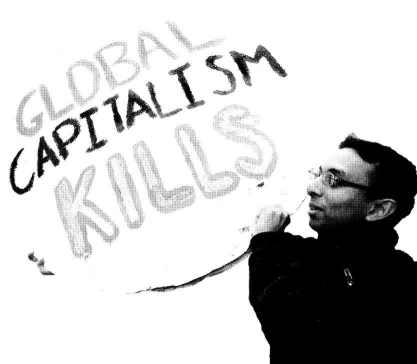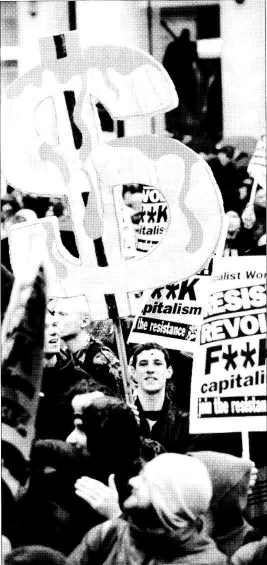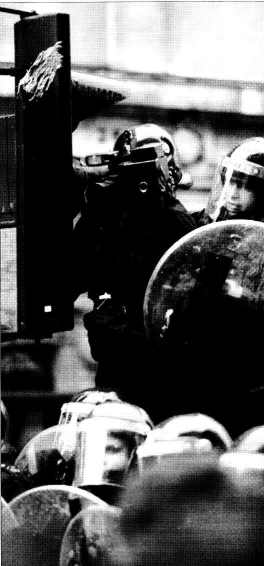
september 2004

Feature Article by Chris Nineham, September 2004
The European anti-capitalist movement will descend on London next month. I look forward to an event of debates and demonstrations. The London European Social Forum (ESF) will be the first time the different strands of the British movement have come together on a grand scale and for many activists it will be their first encounter with the European movement. It will be a great chance to organise new networks of resistance just nine months before the G8 comes to Britain.
Anti Third World debt campaigner Susan George, radical economist Samir Amin and Walden Bello of Focus on the Global South will all be there. Plus socialist filmmaker Ken Loach will present a new cut of Bread and Roses. And former Algerian president and anti-colonial resistance leader Ahmed Ben Bella, along with a new score to Battle of Algiers performed by Asian Dub Foundation, will bring this historic struggle to life.
Given the state of flux of the movement, it's a safe bet that the debates and discussions at the forum will be more important and focused than at previous ESFs. The range of discussion will be very wide. A number of key Latin American activists are coming over to debate the critical situation for the movement in Venezuela, Bolivia, Ecuador and Brazil. Many more organisations than last year are proposing debates about alternatives to neoliberalism, and there will be important seminars on the struggle for democracy in the Middle East, the role of Europe in the world today, and the way government uses aid to reinforce the globalisation project.
The ESF will take place at what is likely to be a critical moment. It comes just two weeks before the US elections at a time when the whole Project for the New American Century appears to be running into the sand. While resistance is growing in Iraq, world opinion continues to harden against the war. In the US a military families' campaign is taking off, and in Britain the call to bring the troops home is getting louder. Meanwhile the wider neoliberal project itself is hugely discredited. This year's European elections punished every incumbent government except in Spain and revealed a deep alienation from the established parties and their common commitment to the market. There could be no better time or place for a massive international mobilisation against the war and the project of corporate globalisation symbolised by the Bush-Blair partnership. But the London ESF will also be an opportunity for important discussions about how to build on the successes of the anti-capitalist movement.
 Just before May Day this year
some British papers carried articles announcing the death
of the global justice movement. This was six months after
the huge European Social Forum in Paris and three months
after the incredible festival of resistance at the World
Social Forum in Mumbai. It was also six weeks before
George Bush's European tour, which was marked with
wonderful symbolism by mass protests from Dublin in the
west to Istanbul in the east. As one Irish newspaper put
it, the only thing that George Bush saw in Europe was the
backsides of policemen in various uniforms protecting him
from the European people. The Bush protests underlined
two points about the movement that the media don't get.
The first is the complex way the global justice movement
has interacted with anti-war mobilisations. The great
protests against the WTO at Seattle in 1999 and the G8 at
Genoa in 2001 changed the face of radical politics in the
west. They showed that different groups could work
together in new ways, and attract support from a huge
pool of people for who privatisation and globalisation
had become dirty words. They also laid the basis for the
anti-war movement that began to organise just months
after Genoa. Building out of Genoa and the experience of
huge anti-war demos in Britain, the ESF in Florence
provided the framework for coordinating international
action on 15 February.
Just before May Day this year
some British papers carried articles announcing the death
of the global justice movement. This was six months after
the huge European Social Forum in Paris and three months
after the incredible festival of resistance at the World
Social Forum in Mumbai. It was also six weeks before
George Bush's European tour, which was marked with
wonderful symbolism by mass protests from Dublin in the
west to Istanbul in the east. As one Irish newspaper put
it, the only thing that George Bush saw in Europe was the
backsides of policemen in various uniforms protecting him
from the European people. The Bush protests underlined
two points about the movement that the media don't get.
The first is the complex way the global justice movement
has interacted with anti-war mobilisations. The great
protests against the WTO at Seattle in 1999 and the G8 at
Genoa in 2001 changed the face of radical politics in the
west. They showed that different groups could work
together in new ways, and attract support from a huge
pool of people for who privatisation and globalisation
had become dirty words. They also laid the basis for the
anti-war movement that began to organise just months
after Genoa. Building out of Genoa and the experience of
huge anti-war demos in Britain, the ESF in Florence
provided the framework for coordinating international
action on 15 February.The flip side of this is that the anti-war movement was more than a single-issue peace movement from the start. People closely identified the war with western corporate greed. For many war is the most extreme expression of what is wrong with every aspect of our lives: the prioritising of profits before people. The interplay between the political and the economic continues. German activists reported last year that it was some of the same people who organised the huge anti-war demos that helped kickstart the massive protests against Gerhard Schröder's austerity measures. A defeat for the coalition in Iraq would be a tremendous boost not just to the people of the Middle East and others under threat from US intervention, but for everyone fighting their corner against neoliberal attacks.
The second thing is the startling reach of the movement's ideas. Nine hundred meetings have been suggested for this year's ESF by everyone from Oxfam and the hip-hop generation to Newcastle GMB and the Italian Communist Refoundation. The fact that the Trade Union Congress has backed the ESF in London is a sign of real interest from the labour movement. You can see the movement's influence in the books people read and the films they go and see. Just when it seemed like the corporations had a stranglehold on the culture industries, counterculture has gone mainstream. Just about every bestseller list has its Michael Moore, its Eric Schlosser or its anti-capitalist anthem. The corporations themselves have noticed and are looking for devious ways to cash in. A recent report by an advertising agency identified 'a new idealism among young people. They are uncomfortable with a world in which design and function are subsumed by the profit motive. At every level they want alternatives to the mainstream and the commercial.'
However, there is also general uncertainty about the future direction of the movement. Many activists can be heard saying that, though besieging the meetings of the G8 and WTO has created an organising focus, in itself it is not enough of a strategy. These kind of protests need to continue because they help to bring the movement to life in new areas. Already there is a great deal of excitement in Scotland about the anti-G8 protests next year. But it is clear that protesting against the international financial institutions and organising counterforums isn't enough. On one hand we need to link the dynamism and critical power of the movement to grassroots struggles to give the movement real social weight. On the other hand the movement needs to stop seeing economic questions in isolation. In the words of Naomi Klein, the challenge now is to shift from a 'vague notion of globalisation to a specific debate about democracy'.
There are three broad strands in the European movement. The first is a style of pressure politics shared by many NGOs but best exemplified by Attac, the biggest European global justice network. Attac groups have played different roles in different countries. Attac's leadership in France played a crucial role in galvanising the 'movement for another world' in the years after the great public sector strikes in France in 1995. Attac Germany helped organise the mass anti-war movement there and more recently worked with the unions to organise two huge days of action against social cuts. But Attac was conceived as an organisation that would challenge neoliberalism mainly at the level of ideas. As honorary president Bernard Cassen says, 'Our fundamental role is to decontaminate people's minds.' Attac's founding mission is to educate the people themselves about the injustices of corporate globalisation and at the same time try to shape policy by putting pressure on governments. Currently they are participating in a project to lauch an alternative European constitution. This approach means they can be peculiarly dismissive of even the most dramatic political developments. For Cassen the 'war on terror' is essentially a sideshow: 'War or peace, the problem of globalisation remained essentially the same on 10 and 12 September.' It is an approach that leads Attac to stay above the political fray and its leaders at least tend to be positively hostile to any plans for root and branch social transformation.
Autonomists are also suspicious of what they see as old style conflictual politics. For the Zapatista guru Subcommandante Marcos, 'You cannot reconstruct the world or society on the basis of a quarrel over who should impose their hegemony on society.' Autonomists reject ideologies and rely on popular initiative to create spaces and processes to sneak diversity and justice into society behind the backs of the policemen and the politicians. They call it changing the world without taking power. There are important autonomist networks in many countries, but these ideas have a wider take up because of cynicism about the old left. The openness of the movement to innovation and creativity has been one of its great strengths. But simply celebrating spontaneity will not provide answers about how to move forward. Consensus is obviously desirable where possible but we can't pretend we can have a non-ideological movement. It would have been impossible to organise the anti-war movement without debating out and taking sides on a whole number of political questions.
Now the whole movement is faced with the question of our attitude to the Iraqi resistance. The 'war on terror' still dominates world politics. These are questions that will be at the heart of the agenda of the ESF.
There are other strategic questions that need to be discussed in London next month. For years now
 activists have been asking how
to make the links between the local and the global, how
to bring the dynamism of Seattle and Genoa to local
activists fighting daily struggles for survival, or for
the preservation of the most elementary public services.
It may not be possible to launch coordinated action
against neoliberal attacks across the continent because
those attacks have different rhythms in different
countries. But what may be possible is to use the London
ESF to call campaigns for unionisation and against low
wages, targeted against different international
employers. In London the Living Wage Campaign has had
spectacular success winning pay and unionisation deals
for low paid, mainly African workers in the new Canary
Wharf financial centre. The organisers are calling a
protest at Canary Wharf to coincide with the ESF, calling
for a living wage for all the cleaners at all the banks
there.
activists have been asking how
to make the links between the local and the global, how
to bring the dynamism of Seattle and Genoa to local
activists fighting daily struggles for survival, or for
the preservation of the most elementary public services.
It may not be possible to launch coordinated action
against neoliberal attacks across the continent because
those attacks have different rhythms in different
countries. But what may be possible is to use the London
ESF to call campaigns for unionisation and against low
wages, targeted against different international
employers. In London the Living Wage Campaign has had
spectacular success winning pay and unionisation deals
for low paid, mainly African workers in the new Canary
Wharf financial centre. The organisers are calling a
protest at Canary Wharf to coincide with the ESF, calling
for a living wage for all the cleaners at all the banks
there.There is a new working class across Europe, very racially mixed, mainly young and more influenced by the spirit of the anti-capitalist movement than by the defeats of the 1980s and 1990s. The trade unions will be better represented in London than at any previous anti-capitalist forum. We need to discuss how to put the new working class at the heart of resistance to globalisation. Finally, it would be a terrible mistake to ignore the democratic deficit created by the global surrender of social democracy to the market.
The recent European elections revealed a deep disaffection with mainstream politics. At the same time in country after country new radical electoral initiatives are being thrown up, often by the movements themselves. For millions of people politics still means elections, and we cannot afford to give the neoliberals an electoral monopoly. We need to discuss and plan new forms of political representation in the forum, or the forum itself risks becoming redundant. The record of the radical wing of the movement has been to push for the widest unity and involvement, while arguing for a fundamental challenge to the globalisers. The London ESF will mark the growing reach of the global justice movement. --------------------------------------------------------------------------------
Chris Nineham is a leading member of Globalise Resistance and is on the steering committee of the Stop the War Coalition. He is helping to organise October's meeting of the European Social Forum in London.